[Dec 2007, Volume 4 Quarterly Issue] Pdf File size - The IIPM Think ...
[Dec 2007, Volume 4 Quarterly Issue] Pdf File size - The IIPM Think ...
[Dec 2007, Volume 4 Quarterly Issue] Pdf File size - The IIPM Think ...
Create successful ePaper yourself
Turn your PDF publications into a flip-book with our unique Google optimized e-Paper software.
MORE MARKETS, LESS GOVERNMENT<br />
what can be provided for in a cognitive<br />
mind set of an individual. <strong>The</strong> calibration<br />
of markets using hierarchy, however,<br />
as the defining attribute, does not quiet<br />
capture all that what make up for markets.<br />
Markets as constructs have evolved<br />
and have changed with time moving<br />
from points at which barter was entered<br />
into to places where the magnitude is at<br />
once large and complex. <strong>The</strong> pattern of<br />
thinking and arriving at explanations<br />
that have accompanied these transformations<br />
have similarly changed course.<br />
What causes them and why these are<br />
useful to transactions in society, therefore,<br />
remain important issues. And these<br />
have been so for some time now if we<br />
exclude the antiquity from the purview.<br />
Arriving At A Framework Handy<br />
Enough For A Debate<br />
<strong>The</strong> market is not an island floating in a<br />
sea of societal events. <strong>The</strong> market is<br />
probably more like an iceberg that has<br />
a ninth of it unseen. <strong>The</strong>se are not institutions<br />
that occur in relative isolation.<br />
Instead these occur when commerce<br />
clearly engages the society as an activity<br />
that a society needs to engage itself<br />
with. Accordingly, and for instance, ‘the<br />
“Spirit” of Capitalism’, in a manner that<br />
Weber approached the issue and elaborated<br />
upon it, probably has a lot to do<br />
with the issue of markets. Weber was of<br />
course concerned with commerce, and<br />
the manner in which this activity<br />
emerged from after being confined to<br />
ethical pits for a long time and particularly<br />
during the Middle Ages and up to<br />
the beginnings of the modern period. As<br />
regards markets, these were accepted as<br />
a part of commerce for these went alongside<br />
commerce. Weber was writing in<br />
the 1890s and he referred to the term<br />
‘economic order’ to which both the individual<br />
and the enterprise had to comply<br />
with. If the modern period is identified<br />
with a pervasiveness of the economic<br />
order and in which compliance comes in<br />
as given, it was not so earlier. ‘<strong>The</strong> capitalist<br />
spirit’ Weber wrote, ‘has had to<br />
prove itself in a hard struggle against a<br />
world of hostile forces.’ 2 On matters related<br />
to the establishment of commerce,<br />
then, we would need to go an earlier author.<br />
Adam Smith in his <strong>The</strong> Wealth of<br />
Nations wrote of the manner in which<br />
feudalism underwent erosion. <strong>The</strong> erosion<br />
had to do with the establishment<br />
and the consequent spread of commerce<br />
and manufacture. <strong>The</strong> observations of<br />
Smith are relevant in yet another manner.<br />
<strong>The</strong> spread of commerce and manufacture<br />
brought in certain fundamental<br />
changes in the society. And finally it<br />
brought in the first hints of the involvement<br />
of the ruling elite in this spread.<br />
<strong>The</strong> Chapter was entitled tellingly “How<br />
the Commerce of Towns Contributed to<br />
the Improvement of the Country”. In it<br />
Smith wrote, ‘commerce and manufactures<br />
gradually introduced order and<br />
good government, and with them, the<br />
liberty and security of individuals.’ 3 <strong>The</strong><br />
rationale for the coming in of peace over<br />
that of warfare that were carried on by<br />
manor lords between themselves was<br />
traced to the declining influence of these<br />
manor lords over the sovereign. <strong>The</strong> surplus<br />
could now be expended on manufactories<br />
that commerce helped deliver<br />
for consumption. And Smith, who was a<br />
votary for individual efforts, once again<br />
empha<strong>size</strong>d on the ‘desire of bettering<br />
(their) condition’. Smith wrote that, ‘<strong>The</strong><br />
natural efforts of every individual to better<br />
his own condition, when suffered to<br />
exert itself with freedom and security, is<br />
so powerful a principle, that it is alone,<br />
and without any assistance, not only capable<br />
of carrying on the society to wealth<br />
and prosperity, but of surmounting a<br />
hundred impertinent obstructions with<br />
which the folly of human laws too often<br />
encumber its operations.’ 4 Smith had his<br />
reservations about commerce and those<br />
who practiced it, and yet he was emphatic<br />
on the impact that commerce and<br />
manufacturing had on society. On the<br />
whole the impact was good. <strong>The</strong>re is a<br />
primacy of economics in his statement<br />
Markets have almost assumed a proxy for the economy.<br />
Markets, then are structures that hold the interest of many.<br />
<strong>The</strong> grip on the interest accrues from a recognition<br />
that markets and human societies have moved in<br />
tandem over long periods of time now<br />
for he points out that the momentum<br />
generated could surmount the hindrances<br />
to progress. It is of these and similar<br />
hindrances that the referencing by Weber<br />
highlighted.<br />
<strong>The</strong> intermixing of politics and economics<br />
was clearly seen by others too<br />
and the emerging viewpoint clarified<br />
that the expansion of economics went<br />
along with an expansion of the political<br />
landscape. Of the many who wrote on<br />
this issue, Adam Fergusson (1723-1816),<br />
THE INDIA ECONOMY REVIEW<br />
25


![[Dec 2007, Volume 4 Quarterly Issue] Pdf File size - The IIPM Think ...](https://img.yumpu.com/29766298/24/500x640/dec-2007-volume-4-quarterly-issue-pdf-file-size-the-iipm-think-.jpg)
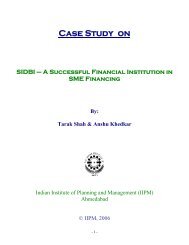
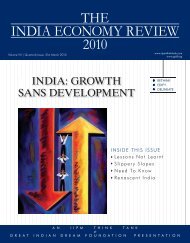
![[Feb 2008, Volume V Annual Issue] Pdf File size - The IIPM Think Tank](https://img.yumpu.com/43961117/1/190x245/feb-2008-volume-v-annual-issue-pdf-file-size-the-iipm-think-tank.jpg?quality=85)
![[June 2008, Volume V Quarterly Issue] Pdf File size - The IIPM Think ...](https://img.yumpu.com/41693247/1/190x245/june-2008-volume-v-quarterly-issue-pdf-file-size-the-iipm-think-.jpg?quality=85)

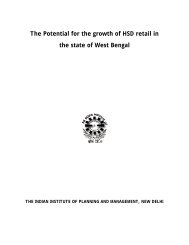
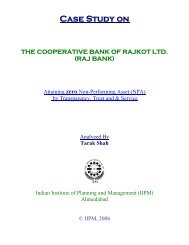
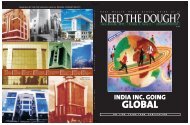

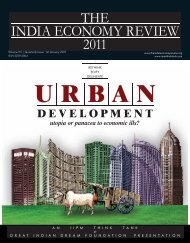
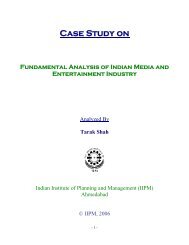
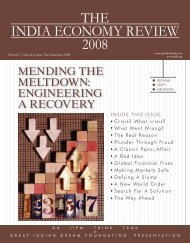
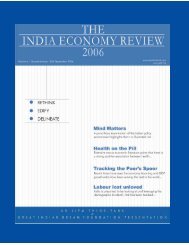
![[Volume VI | Quarterly Issue: 31st May 2009] Pdf File size](https://img.yumpu.com/27796051/1/190x245/volume-vi-quarterly-issue-31st-may-2009-pdf-file-size.jpg?quality=85)